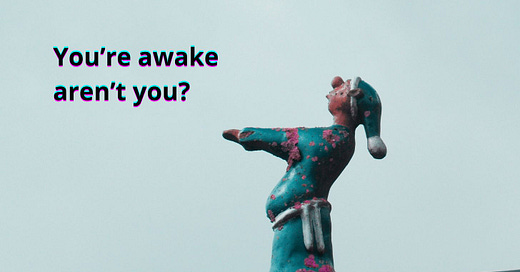
Hey — it’s Mark.
It’s 6PM and raining outside. I’ve been thinking about sleepwalking through parenting, and how to make sure I’m truly present. But two hungry girls are waiting. Dinner preparation waits for no-one. It’s time to hit send on the first email.
1. Reflection
Dopamine hits are fleeting.
That meme? That work email? They’ll be forgotten in five minutes. But your kid’s childhood? That’s evaporating while you’re double-tapping someone else’s highlight reel.
Next time they’re belly-laughing like a lunatic or hitting you with their 87th “Why?”—pause and soak it in. Look them in the eyes. Respond like it matters. Because it does.
There’s no snooze button on this parenting gig. One day, that goofy little voice will crack, the wild questions will stop, and they’ll be too busy for you.
2. Questions For You
If your child could rate your attention this week, what would they say:
Fully present
Distracted, or
Somewhere in between?
What would you want them to say?
(Hit ‘reply’ and share your thoughts)
3. Conversation To Ponder
The mom faced the philosopher in a small, sunlit room, coffee in hand. Alfred Adler’s thinking had helped her before. Today, she wanted to understand a nagging worry: her attention, always slipping away from her child, tugged by the invisible threads of a busy life.
PARENT: Yesterday, my daughter was telling me a story, and I caught myself nodding along while reading an email. She paused and looked at me. ‘Are you listening, Mom?’ I was—but not really. I’m always there. Physically, I mean. But I feel like I’m not really there. My phone’s always buzzing, or I’m half-thinking about work. I want to do better, but it’s hard. What would someone like Adler say about this?
PHILOSOPHER: Let’s explore this together. Tell me, when you’re with your children and your attention drifts, to your phone, to your work, what do you think is happening in that moment?
PARENT: Well, I guess I’m distracted. There’s always something pulling at me. Emails, notifications, a to-do list in my head. It’s like I can’t shut it off.
PHILOSOPHER: And when you’re pulled away like that, what do you suppose your child experiences?
PARENT: Hmm. I’d say they probably notice I’m not fully listening. My daughter will sometimes tug at my arm or repeat herself louder, like she’s trying to pull me back. It makes me feel guilty, honestly.
PHILOSOPHER: Guilt is an interesting feeling, isn’t it? But let’s set it aside for a moment. Adler would ask us to look at this differently. Not through the lens of guilt, but through purpose. What do you think is the purpose of your presence when you’re with your child?
PARENT: The purpose? I suppose it’s to be there for them. To listen, to play, to help them feel loved and secure.
PHILOSOPHER: Yes, precisely. Adler believed that all human behavior has a purpose, and as a parent your purpose in that moment is to connect with your child. Now, when you turn to your phone or let your mind wander to work, are you fulfilling that purpose?
PARENT: No, I’m not. I’m letting something else take over. But those distractions feel so urgent. Like if I don’t check that email, I’ll fall behind. Or if I don’t respond to a text, someone will be upset.
PHILOSOPHER: I see. Let’s examine that. Adler spoke of life as a series of tasks. Work tasks, social tasks, and the tasks of love and family. He argued that we often avoid certain tasks by hiding behind others. Could it be that when you reach for your phone, you’re escaping the task of being fully present with your child?
PARENT: Escaping? That sounds harsh. I’m not trying to avoid my kids. It’s just that everything else piles up, and I feel pulled in a million directions.
PHILOSOPHER: I don’t mean to suggest you wish to flee your children. But Adler believed we create our own feelings and habits to serve a purpose. When you feel “pulled in a million directions,” who is doing the pulling?
PARENT: Me, I guess. I’m the one picking up the phone or letting my mind wander. No one’s forcing me.
PHILOSOPHER: Exactly. You have the freedom to choose. Adler would say that your distractions aren’t inevitable, they’re a choice. Even if they don’t feel like it in the moment. And every choice reflects a goal. What goal might you be pursuing when you turn away from your child to check your phone?
PARENT: Maybe… to feel in control? If I stay on top of work or messages, I feel like I’m managing my life. Being with my kids sometimes feels messier, less predictable.
PHILOSOPHER: That’s a keen insight. Control is a powerful lure, isn’t it? But Adler would challenge that. He’d say that seeking control over external things, like emails or schedules, often comes from a fear of facing the present moment as it is. With your child, there’s no script, no checklist. It’s raw, human connection. Does that scare you?
PARENT: A little, yeah. What if I mess up? What if I don’t know what to say when they ask me something tough, or I lose my patience? It’s easier to scroll through my phone than to face that uncertainty.
PHILOSOPHER: And yet, Adler would argue that this uncertainty is exactly where your task lies. He called it “social interest.” The courage to engage fully with others, not for perfection, but for connection. When you’re distracted, you’re not just avoiding uncertainty. You’re avoiding your child. What might happen if, instead, you chose to stay present, even when it’s uncomfortable?
PARENT: I suppose my daughter might feel more seen. She’d know I’m really with her. And maybe I’d feel less scattered, too. But how do I even start? The distractions are everywhere.
PHILOSOPHER: Adler’s answer is simple, though not easy: You decide your own purpose each moment. If your purpose is to be with your child, then the phone, the work, the buzzing, they become irrelevant. Not because they disappear, but because you choose not to give them power. Imagine you’re sitting with your daughter and your phone lights up. What do you do?
PARENT: Normally, I’d glance at it, maybe pick it up. But if I’m choosing to be present… I’d ignore it. Let it sit there. Focus on her instead.
PHILOSOPHER: Yes. And in that choice, you’re living what Adler called “the here-and-now.” Not the past, not the future, not the inbox. But this moment, with her. It’s a small act, but a radical one. How does that feel to you?
PARENT: It feels… freeing, actually. Like I don’t have to be everything to everyone all at once. I can just be her mom, right then and there. But what if I fail sometimes? What if I get distracted again?
PHILOSOPHER: Failure isn’t the point, according to Adler. The point is courage. The courage to keep choosing presence, even imperfectly. Every moment is a new chance to decide. Your child doesn’t need a perfect parent. She needs one who strives to be with her. Will you take that task on?
PARENT: I will. It’s not about never messing up. It’s about showing up, again and again. I think I can do that.
PHILOSOPHER: Then you’ve already begun. Adler would say you’re not just changing your behavior, you’re transforming how you see your role as a parent. Presence isn’t just a gift to your child. It’s also a practice that shapes who you are. What do you think about that?
PARENT: I think it’s a relief. It’s not about fixing everything. It’s about being here. I’m going to try it tonight. No phone, no wandering thoughts. Just me and her.
Until next week,
Mark Snape
P.S. If you found The Socratic Parent valuable, subscribe and share a link with your best parenting friend!





